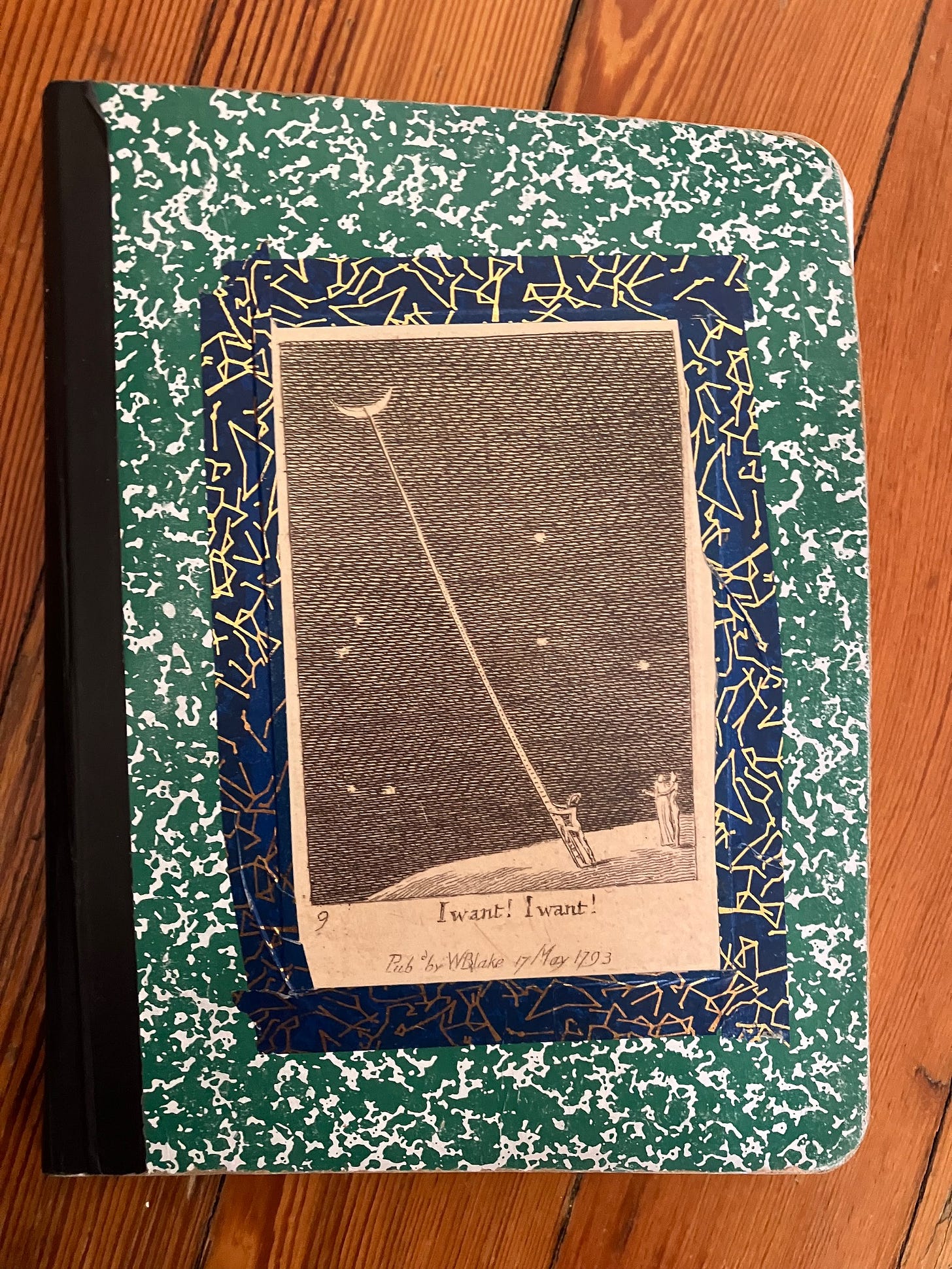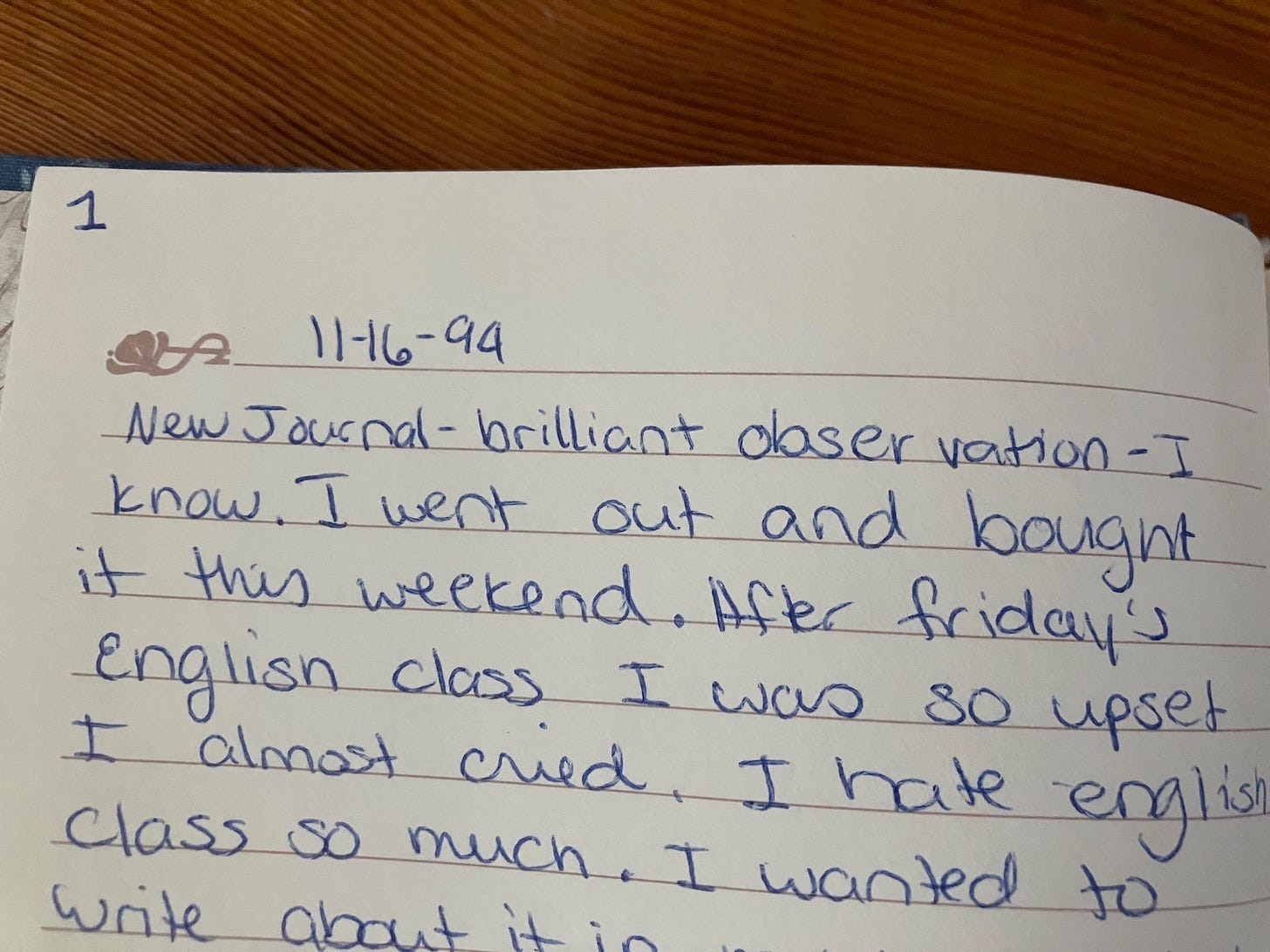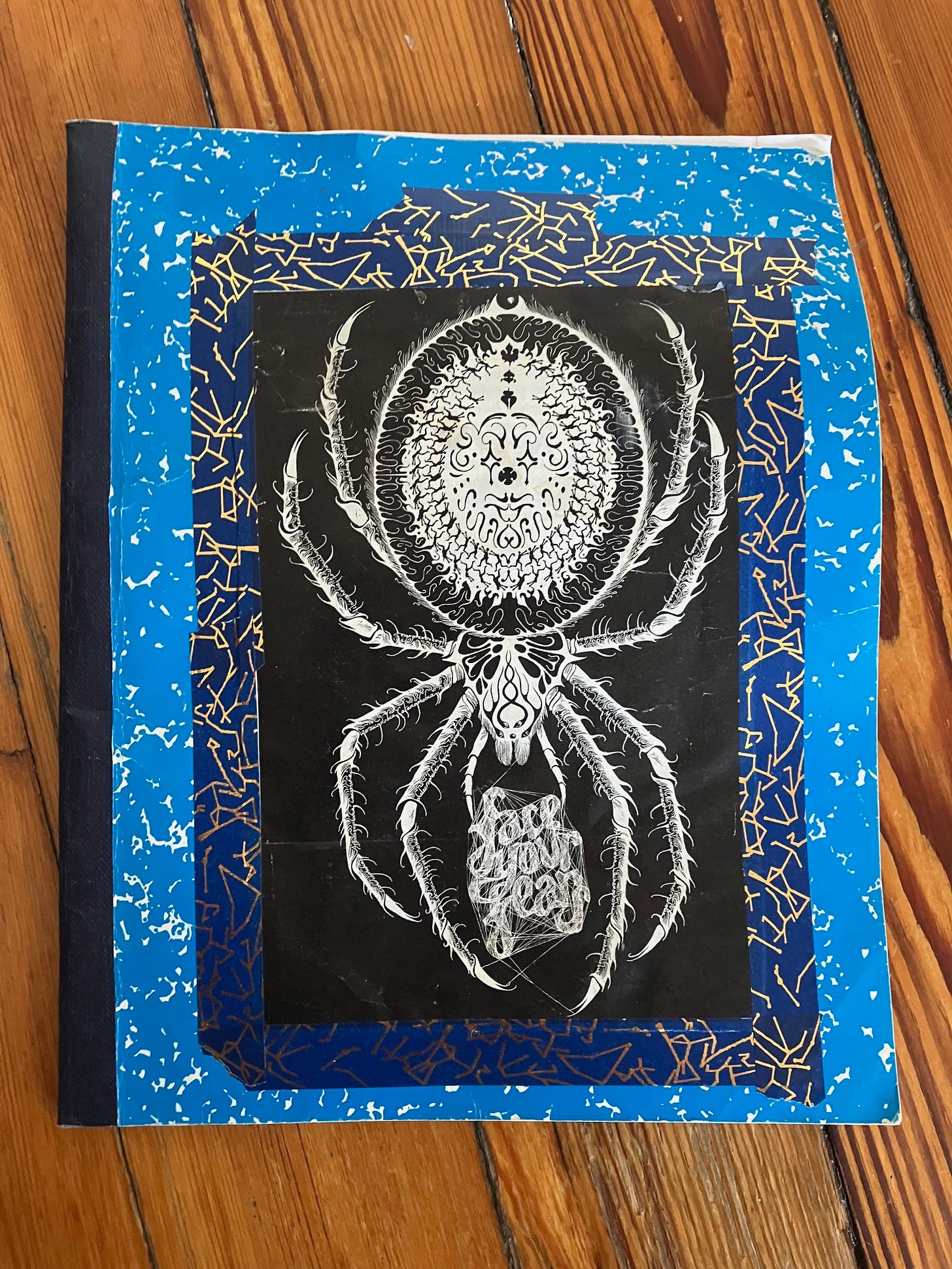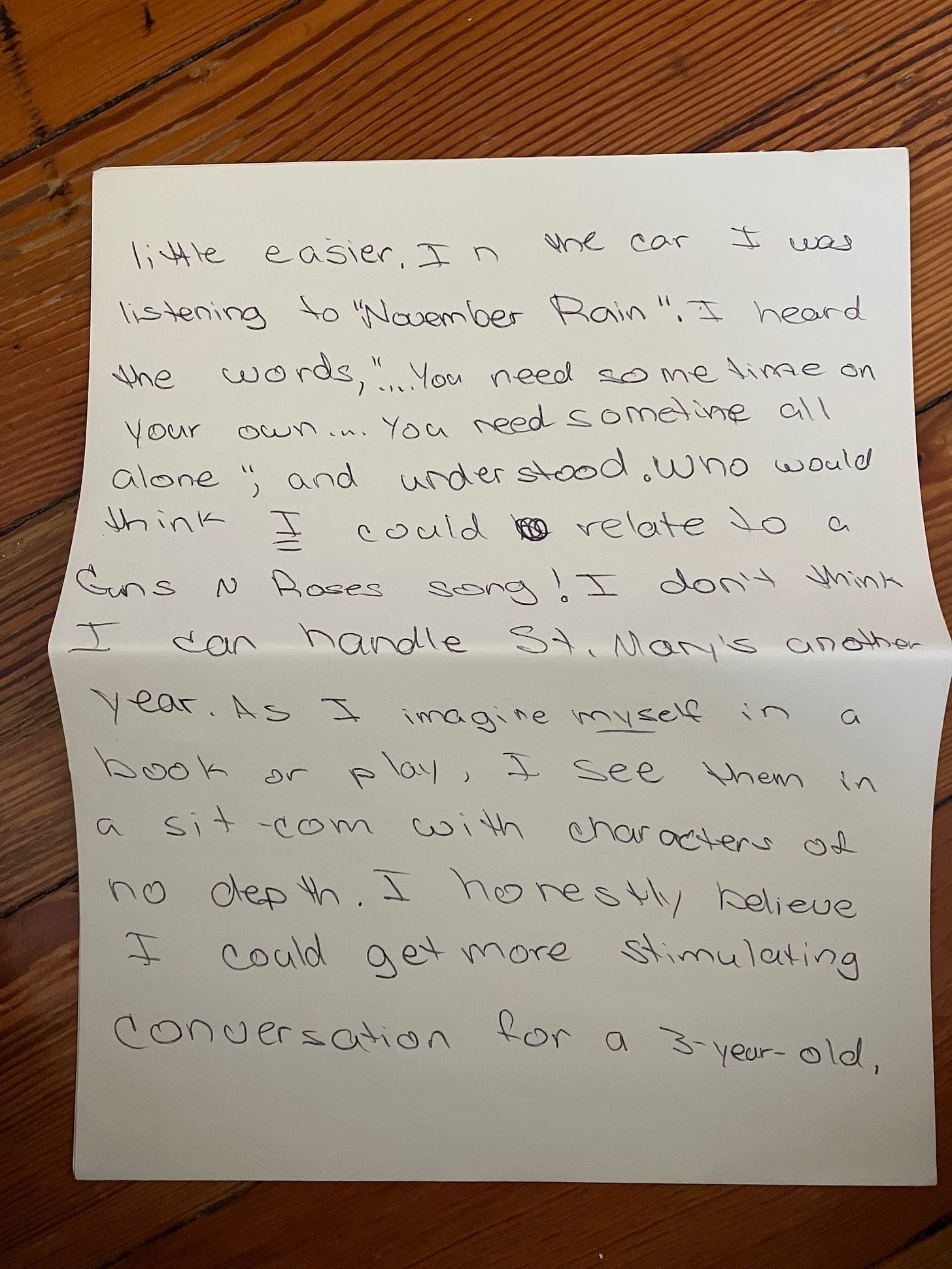Hello there! Welcome to The Magpie, a newsletter that serves as a collection of shiny objects about writing, creativity, hopes, and obsessions. My current obsession is diaries and the people who write them. Since I started keeping one at age eight, my diary has been a place of exploration and intensity, of lists and favorite quotes, of ticket stubs and wildflowers. It is a place to remember and a place to dream.
My most recent book, The Leaving Season: A Memoir in Essays, is out now! I relied on decades of my own diaries to help me write this book. My next book focuses on historical diaries of women, famous and not, and why we continue to write—and read!—these archives.
This is a Show Me Your Diary interview, a series that explores diaries and the creatives who keep them. Every week, I ask a new person to give us a peek inside their diary process, complete with photos. Yes, we are very nosy!
Want to show me your diary, or know somebody who does? Send me an email—you can just reply to this newsletter. Let’s get started…
Today’s interview is with Domenica Ruta, a writer I’ve known and admired for a very long time. Her newest book, the big, beautiful novel All the Mothers, just published this week and I’m so excited to be in conversation with her TONIGHT at Community Books in Brooklyn (7pm, free, I promise to make sure you don’t leave your umbrella at the bookstore!).
All the Mothers is about mothering (especially solo mothering), community, grief, and the tumult of those early years as a new mother. It is also about the flimsy and/or non-existent support structures available to new mothers, both on a government and inter-personal level, and the creative, desperate, brilliant alliances that women build with each other to fill in those gaps. Sandy, the main character, battles both her own demons as well as the ghost of her mother, who dies early on in the book and whose voice remains in Sandy’s head and heart, for better or worse. Domenica writes about complicated mother-loss in such a visceral and real way: “Sandy’s heart was so broken sometimes she would touch her chest and be shocked to find it was not wet from blood. It was a pain so profound she forgot what life had ever felt like before.”
Also, it is really fucking funny.
Reading this book had me alternating between laughing out loud, cursing out loud, being stopped in my tracks by beautiful line after beautiful line, and building lists in my journal about who I want in my own mommune. As in her other books, Domenica nails so many single-mom moments, especially the painful ones with “well-meaning” friends who tell her not to worry, she’ll find a husband, “an implication that Sandy and Rosie were an incomplete story, a story that they, the loving and heroic friends, could write a happy ending to. Sandy was not a new mother with a perfect baby; she was a problem to be solved.” At our current political moment, shining light on alternate family structures in the way that this novel does could not be more needed. (See: we are not an incomplete story, no matter what our government’s policies say.)
Back when I ran my bookshop in rural Pennsylvania, I also ran a summer reading series and, at the suggestion of the glamorous Lauren Cerand who’d come to visit, I called in a copy of Domenica’s newly-published book With or Without You. Anyone who has read this book (if you haven’t, what are you waiting for?) knows the power, the intensity, the frankness of this narrator and the way she pulls you in.
In her memoir, Domenica weaves in passages from her old diaries. "Now what?" I wrote in my journal. I was thirteen going on fourteen and my handwriting was tiny and painstakingly neat. As we discuss below, mining old diaries for one’s writing work can be an exhilarating and emotionally taxing experience, and I loved this shared intimacy on the page. Domenica was one of the first writers I thought of for this series, and I was so excited to read her sharp and intelligent answers, which remind me so much of why I love reading her on the page.
Below we talk about the tragic fate of Domenica’s childhood diaries, reading her own son’s diary, and the way she often will work out a draft in her diary before moving to the page.
And, of course, she lets us peek inside some of her actual diaries!
THE MAGPIE: Team Diary vs Team Journal? What do you like to call it?
DOMENICA RUTA: I graduated myself from Team Diary to Team Journal in middle school. Journal felt so important and mature, something a real writer kept, while diary seemed to me like a relic of childhood. Like, please, grow up. As an ersatz adult and someone who now lists “writer” on her tax filing, I continue to use the word journal, but mostly as a default. I don’t actually have a strong opinion on it either way.
How long have you kept a diary?
Since I was very young, basically as soon as I could write sentences I started compiling thoughts in notebooks I scavenged, probably from school. My first real diary I got probably in third or fourth grade.
What do you hope will happen to your journals once you are gone?
Having gone to UT Austin for grad school, the running joke was, “but will this [terrible first draft, etc.] end up in the Ransom Center?” I think that my ghost would be very embarrassed for that to happen. When I’m 80, I will curate the best little bits from the journals I have managed to save and see if anyone wants to publish them. Then I will burn the embarrassing parts (the majority) and give the remaining scraps to my family and let them decide.
I loved [my first diary] so much it hurts to think about now. As an object in and of itself I was sure it was magic.
What do you remember about your first diary?
My first diary had a padded turquoise plastic cover with some swirly designs in purple and pink – this was the Lisa Frank epoch, for context -- and a little silver lock and key. I loved it so much it hurts to think about now. As an object in and of itself I was sure it was magic.
When I wrote in it – sporadically, an anti-pattern that persists today – I felt connected to something bigger. Mind you, I mostly wrote about the kids I didn’t like at school and the injustices I perceived as a kid forced to live in a world governed by mentally ill drug addict adults (my parents), though I didn’t understand any of that then. This is all an elaborate way to say I used my diary as a repository of complaints.
Sadly, that diary is lost along with most of the photos of my child hood and other paper-based ephemera because one of the said drug addicts put the cardboard box that contained all this on top of a hot water heater in the cellar and everything disintegrated.
What is your favorite type of diary to use?
It’s usually a very pragmatic decision – whatever looks sturdy, fits in my purse. I need lines. I like a composition notebook but I’m not loyal to them, or any brand.
I operate purely on vibes with respect to journaling. It is mostly my tool for warming up for writing something more substantial, like a first draft, though it is also a tried and true procrastination tool for not writing that first draft.
When do you write in your diary?
Tallulah Bankhead famously said, “Only good girls keep diaries. Bad girls don’t have time.” I heard that quote sometime in high school and it justified my whole existence, not only my sporadic journal practice. And though I am no longer a bad girl, (winks) I still don’t have time to write with any regularity or pattern. I operate purely on vibes with respect to journaling. It is mostly my tool for warming up for writing something more substantial, like a first draft, though it is also a tried and true procrastination tool for not writing that first draft.
Has anyone ever read your diary? Have you ever read someone else’s diary?
Two years ago my oldest kid surprised me by asking for a diary for this birthday. He is very bright and creative but he is allergic to anything that smells like school work and was and still is resistant to doing the writing he’s assigned at school. He was super specific about what he wanted for a diary and we called around a few stores before we found it – a brown faux-leather bound lined journal. Like me, he embellished the cover, in his case with an original a drawing that I helped him tape down. He blew my mind and his teachers’ minds by writing in that thing almost every single day for a year.
I read it regularly, to make sure nothing horrible was happening to him that he was keeping secret – one of my biggest fears – and also because I’m nosy and curious. His teachers did, too. We confessed this to each other at a conference. And we were all in agreement that he is – I know I’ll sound like an annoying mom here, but try to just trust me – a genius writer. His entries were full of these gorgeous observations that I didn’t know he even noticed (he’s a touch on the spectrum) and wildly funny. Not like, little kids are cute and that’s funny. Like, genuinely good, comedy-writing funny.
Then one day he stopped. He was done writing in his diary. He goes through phases like that – big bursts of creative energy that sustain for a long time, then long stretches where he just hangs out and plays video games and watches TV. Come to think of it, I am exactly the same way…
Who are you writing to in your diary?
I wonder this from time to time, though I try not to or else I get ensnared in self-consciousness and my voice becomes painfully meta-cognizant and awkward and afraid. I think there are many dozens of selves in one’s mind, a confederacy of dunces in my case; some of them iterations of me trapped in the amber of time, some newly liberated thanks to therapy and emotional mastery milestones, some banished for her taboo desires and opinions, some mean and ungenerous, some wild and purely creative. I try to let my journal be a space where all these selves can communicate with each other, a space for whoever needs to talk to hold the pen, and for the journal itself to be a lawless place that allows for everyone and everything to show up when it wants.
I try to let my journal be a space where all these selves can communicate with each other, a space for whoever needs to talk to hold the pen, and for the journal itself to be a lawless place that allows for everyone and everything to show up when it wants.
How long does it take you to fill a diary?
What’s funny is that as irregular as I am at keeping a journal, it always takes me about 13 months to fill one, which is the witch’s calendar year.
Do you ever re-read your old diaries?
I remember when I was publishing my first book, a memoir, I had a long conversation with the legal department at Random House and the lawyer told me to go and read all my diaries searching for “proof” just in case. I did, and then shortly after got the Norovirus and slept on my bathroom floor for three days. I tried to again for the first time since then for this very assignment and I couldn’t do it – it was too painful.
What are some ways keeping a diary fosters creativity and vice versa?
So many of early drafts sprout up first in my journals. I think because it is a place where I am allowed to relax a little, a place where I don’t have to try to be good or sound good, that as I’m bitching about my body or my marriage or the state of the world, venting my petty resentments and helpless agonies about the world, something in the subconscious loosens up and then the voice of this character or the setting for that scene come tumbling out. When that happens, I highlight it in another color so I can find it easily when it’s time to sit down with the word document.
More About Domenica Ruta:
Domenica Ruta is the NYTimes bestselling author of the memoir With or Without You and the novel Last Day, a 2019 NYT Notable book of the year, as well as co-editor of the anthology We Got This: Solo Mom Stories of Grit, Heart and Humor. She's published short fiction and essays in the Iowa Review, the Boston Review, the Indiana Review, Epoch, Ninth Letter, The Cut, and elsewhere, and has been anthologized a handful of times, most notably in Wanting. She publishes personal essays with zero regularity and lots of love for free on her Substack. Her latest novel, All the Mothers, is on sale now everywhere books are sold. To find out if she doing a reading or event in your area, check out her website or follow her on Instagram at @domenicaruta .
To keep up with her events, check out Domenica’s website, but here are two unmissable ones:
May 9, 2025 Domenica Ruta in conversation with Kelly McMasters (oh, hey!) at Community Bookstore in Brooklyn (free, 7-8pm)
May 13, 2025 Not Your Mother’s Mother’s Day: A Conversation With Ruthie Ackerman, Amanda Hess, Nicole Graev Lipson, Nancy Reddy, and Domenica Ruta at Hummingbird Books in Boston (tix required, 7-8:30pm)
Thanks for reading The Magpie by Kelly McMasters! As always, more of what I’m up to can be found on my website, and you can follow me on Instagram for day-to-day updates.
Buy The Leaving Season here, Welcome to Shirley here, Wanting: Women Writing About Desire here, and This is the Place: Women Writing About Home here.













